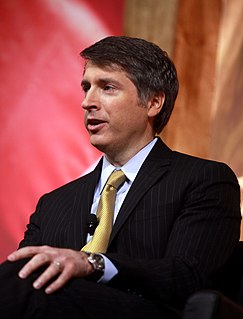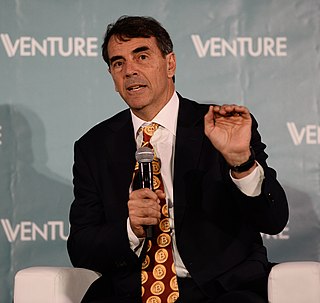Top 1200 Fuel Prices Quotes & Sayings - Page 4
Explore popular Fuel Prices quotes.
Last updated on December 18, 2024.
I do not mean to impugn the social justice and social expediency of the redistribution of incomes aimed at by N.I.R.A. and by the various schemes for agricultural restriction. The latter, in particular, I should strongly support in principle. But too much emphasis on the remedial value of a higher price-level as an object in itself may lead to serious misapprehension as to the part which prices can play in the technique of recovery. The stimulation of output by increasing aggregate purchasing power is the right way to get prices up; and not the other way round.
The American people have no idea they are paying the bill. They know that someone is stealing their hubcaps, but they think it is the greedy businessman who raises prices or the selfish laborer who demands higher wages or the unworthy farmer who demands too much for his crop or the wealthy foreigner who bids up our prices. They do not realize that these groups also are victimized by a monetary system which is constantly being eroded in value by and through the Federal Reserve System.
You know what I think?" she says. "That people's memories are maybe the fuel they burn to stay alive. Whether those memories have any actual importance or not, it doesn't matter as far as the maintenance of life is concerned. They're all just fuel. Advertising fillers in the newspaper, philosophy books, dirty pictures in a magazine, a bundle of ten-thousand-yen bills: when you feed 'em to the fire, they're all just paper.
We can't change the fossil fuel companies' behavior in isolation from the rest of the industrial system. As long as they have customers, they're going to continue to operate, whether or not we divest of their stock. However, divesting might be helpful in terms of disrupting the story that what these companies do is perfectly okay. This situation differs from apartheid in a key regard though: racial equality in South Africa was no threat whatsoever to capitalism as we know it. Ending the fossil fuel era is a much deeper change.
The horn of dilemma of energy politics is what really drives concern about this energy in this country, at the gut level for most people, is high gas prices. And if you really want to fight global warming and try to reduce our carbon emissions, the cleanest, easiest, most rational way to do it would to make the price of gas even higher through very stiff gas prices.
The bottom half of humanity is living in severe poverty; not all of them are malnourished or severely deprived now, but they are extremely vulnerable to even small upsets in their income or in the prices they face of basic necessities, and when something like this happens, they can be thrown off kilter in terms of a disease of a family member or a change in food prices; anything like that can throw them into destitution.
By mastering both aspects of our being we remember not only how to think, but what to think. What I'm clear about now is that the mind is a tool, a mechanism, and the soul provides the fuel for that machine. The less fuel you use, the more inefficiently the engine will operate. On the other hand, if your soul fills your mind with spiritual energy, you will be Mind-Full - and the workings of this engine can produce miracles.
That "ol' black magic" is a fickle force. The chemistry of romantic love can trigger the chemistry of sexual desire and the fuel of sexual desire can trigger the fuel of romance. This is why it is dangerous to copulate with someone with whom you don't wish to become involved. Although you intend to have casual sex, you might just fall in love.
The idea that when people see prices falling they will stop buying those cheaper goods or cheaper food does not make much sense. And aiming for 2 percent inflation every year means that after a decade prices are more than 25 percent higher and the price level doubles every generation. That is not price stability, yet they call it price stability. I just do not understand central banks wanting a little inflation.
The proximity of an army causes prices to go up; and high prices cause people's substance to be drained away. When their substance is drained away, they will be afflicted by heavy exactions. With this loss of substance and exhaustion of strength, the homes of the people will be stripped bare, and their incomes dissipated.
When Americans are called on to innovate, that's what we do - whether it's making more fuel-efficient cars or more fuel-efficient appliances, or making sure that we are putting in place the kinds of equipment that prevents harm to the ozone layer and eliminates acid rain. At every one of these steps, there have been folks who have said it can't be done. There have been naysayers who said this is going to destroy jobs and destroy industry. And it doesn't happen because once we have a clear target to meet, we typically meet it. And we find the best ways to do it.
The attributes of God have been carefully explored. But the Devil's attributes have been left vague. I think I've found one of them. It is he who puts the prices on things." "Doesn't God put a price on things?" "No. One of his attributes is magnanimity. But the Devil is a setter of prices, and a usurer, as well. You buy from him at an agreed price, but the payments are all on time, and the interest is charged on the whole of the principal, right up to the last payment, however much of the principal you think you have paid off in the meantime.
We're more familiar with what economists call an English auction - prices start low and rise as people bid. However, there is also the Dutch auction, where prices start high and go lower until somebody bites. Movies are sold to the audience via a very slow Dutch auction, where each phase between price drops can last weeks or months.
The generally accepted view is that markets are always right -- that is, market prices tend to discount future developments accurately even when it is unclear what those developments are. I start with the opposite view. I believe the market prices are always wrong in the sense that they present a biased view of the future.
It's quite clear that stocks are cheaper than bonds. I can't imagine anybody having bonds in their portfolio when they can own equities, a diversified group of equities. But people do because they, the lack of confidence. But that's what makes for the attractive prices. If they had their confidence back, they wouldn't be selling at these prices. And believe me, it will come back over time.
We have this highly irrational system of incentivizing innovation for clean and green technologies, where we allow the innovator to have a temporary monopoly and then mark up the price of the product or sell licenses at high prices to those who want to use the kind of product that the innovator has invented. This system is collectively irrational because many people, to avoid the inflated prices of still-patented cleaner and greener technologies, opt for some older technology that is much more polluting.
If you want more people to come to the theatre, don't put the prices at £50. You have to make theatre inclusive, and at the moment the prices are exclusive. Putting TV stars in plays just to get people in is wrong. You have to have the right people in the right parts. Stunt casting and being gimmicky does the theatre a great disservice. You have to lure people by getting them excited about a theatrical experience.
Though the two issues may seem utterly unrelated, they do have this in common - both health care and higher education are realms of American life in which government has undermined the operation of market forces and caused artificially high prices. These are two arenas in which the Democrats now propose to do exactly the wrong thing. Their reform reinforces old errors and will infinitely compound the problem of rising prices.
...A one-pound box of prewashed lettuce contains 80 calories of food energy. According to Cornell ecologist David Pimentel, growing, chilling, washing, packaging, and transporting that box of organic salad to a plate on the East Coast takes more than 4,600 calories of fossil fuel energy, or 57 calories of fossil fuel for every calorie of food.
Money and prices and markets don't give us exact information about how much our suburbs, freeways, and spandex cost. Instead, everything else is giving us accurate information: our beleaguered air and watersheds, our overworked soils, our decimated inner cities. All of these provide information our prices should be giving us but do not.
If you expect to be a net saver during the next 5 years, should you hope for a higher or lower stock market during that period? Many investors get this one wrong. Even though they are going to be net buyers of stocks for many years to come, they are elated when stock prices rise and depressed when they fall. This reaction makes no sense. Only those who will be sellers of equities in the near future should be happy at seeing stocks rise. Prospective purchasers should much prefer sinking prices.
People always get what they want. But there is a price for everything. Failures are either those who do not know what they want or are not prepared to pay the price asked them. The price varies from individual to individual. Some get things at bargain-sale prices, others only at famine prices. But it is no use grumbling. Whatever price you are asked, you must pay.
The illusion that consumption - and its correlative, income - is desirable probably stems from too great preoccupation with what Knight calls "one-use goods," such as food and fuel, where the utilization and consumption of the good are tightly bound together in a single act or event. ... any economy in the consumption of fuel that enables us to maintain warmth or to generate power with lessened consumption again leaves us better off. ... there is no great value in consumption itself.
Target prices? How that works? I know quite a bit about farm policy. I come from Indiana, which is a farm state. Deficiency payments - which are the key - that is what gets money into the farmer's hands. We got loan, uh, rates, we got target, uh, prices, uh, I have worked very closely with my senior colleague, (Indiana Sen.) Richard Lugar, making sure that the farmers of Indiana are taken care of.
You really do have to wonder whether a few years from now we’ll look back at the first decade of the 21st century — when food prices spiked, energy prices soared, world population surged, tornados plowed through cities, floods and droughts set records, populations were displaced and governments were threatened by the confluence of it all — and ask ourselves: What were we thinking? How did we not panic when the evidence was so obvious that we’d crossed some growth/climate/natural resource/population redlines all at once?
Imagine the peace symbol. The peace symbol has three pieces in it. One piece is emotion, that's your body. Another piece has spirit in it, that's your fuel. Another piece has intellect in it and that's your steering wheel. You can never overdo the fuel that goes into the body, which is the emotions and the steering wheel to drive it.
We used to be a source of fuel; we are increasingly becoming a sink. These supplies of foreign liquid fuel are no doubt vital to our industry, but our ever-increasing dependence upon them ought to arouse serious and timely reflection. The scientific utilisation, by liquefaction, pulverisation and other processes, or our vast and magnificent deposits of coal, constitutes a national object of prime importance.
If you love with violence and you hate with violence, there's nothing that can be questioned. People say, 'Oh, you'd better work through your resentments.' Yeah, no. I'm gonna hang on to them, and they're gonna fuel my attack. And they're going to fuel the battle cry of my deadly and dangerous and secret and silent soldiers. Because they're all around you. Sorry, you thought you were just messing with one dude. Winning.
We think of prices as simply the notation of how much we must pay for things. But the price system accomplishes far more than that. Hundreds of millions of people buying and selling, and abstaining from buying and selling, generate a system of signals - prices to producers and consumers about relative scarcities and demand. Through this system, consumers can convey to producers their subjective priorities and entrepreneurs can invest accordingly.
Initially, QE contributed to a pretty significant increase in inequality. It raised asset prices, which are owned primarily by the wealthy, while having relatively small if any positive impacts on bank lending, employment, wages or economic growth, so ordinary people haven't had much help. By the third round of QE in 2012-2014, the effects had likely muted quite a bit. There were probably not big impacts on asset prices from QE and the positive effects on employment growth might have strengthened somewhat.
In the European Union, a fleet average of 95 grams of CO2 per kilometer will be permitted in 2020. This corresponds to fuel consumption of about four liters (per 100 kilometers; about 59 mpg). We have to continue reducing the fuel consumption of our vehicles and offer hybrid and electric vehicles, or else we will be unable to achieve these values.
I would say that, from an agricultural perspective, I have a little bit of concern, because some of the folks I don't know are particularly supportive of the renewable fuel industry and the renewable fuel standard, which is a big part of certainly Midwestern agriculture. I'm hopeful that, when we see his ultimate selection for ag secretary, that we will see someone who is a strong advocate for renewable fuels, and what that means to Midwestern producers. And, for that matter, now, all over the country, we're seeing more and more of the biofuels being produced from a variety of sources.
So, you're seeing the Rolls-Royces and the Bentley's still selling for big prices. You're seeing jewelry still selling, art works at auction. There was a diamond that sold for I think 38 million, 48 million, something like that just a week ago. So prices are back up to their highs, getting stronger and more and more people seem to have more and more money to spend.
Since it is the very substance of the animal, it is the blood which transports the fuel.If the animal did not habitually replace, through nourishing themselves,what they losethrough respiration, the lamp would very soon run out of oil and the animal would perish, just as the lamp goes out when it lacks fuel.
When Cuba lost their fossil fuel pipeline when the Soviet Union collapsed in 1990. Overnight they had no choice, they had to transition to clean energy, they didn't have any fuel to burn, and they also had to transition to a healthy food system, an organic system - their economy is crashing, this was not a planned transition. This was a crisis, but a crisis nonetheless, in which pollution went away. And it's very instructive to see what happened to their health.





















































